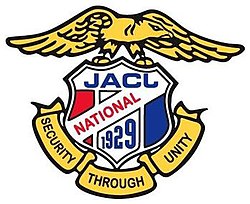 | |
 JACL's San Francisco headquarters in 2021 | |
| Founded | 1929 |
|---|---|
| Type | 501(c)(3) charitable organization |
| Focus | Asian American civil rights |
| Headquarters | San Francisco, United States[1] |
| Location |
|
| Website | jacl |
The Japanese American Citizens League (日系アメリカ人市民同盟, Nikkei Amerikajin Shimin Dōmei) is an Asian American civil rights charity, headquartered in San Francisco, with regional chapters across the United States.[2][3]
The Japanese American Citizens League (JACL) describes itself as the oldest and largest Asian American civil rights organization in the United States, focusing on civil and human rights of all Americans, particularly the Asian Pacific American community.[2][4] The organization was formed in 1929 out of existing Nisei organizations in California and Washington.[5]
In its early years, the JACL lobbied for legislation that expanded the citizenship rights of Japanese Americans,[6] and local chapters organized meetings to encourage Nisei to become more politically active. During and leading up to World War II, the JACL was criticized for its decision not to use its political influence to fight the incarceration of Japanese Americans, aiding U.S. intelligence agencies in identifying "disloyal" Issei, and taking a hardline stance against draft resisters in camp.[7] These issues remain[when?] a source of division within the Japanese American community and the organization itself.
After the war, the JACL returned its primary focus to civil rights legislation, lobbying Congress and bringing lawsuits to overturn or amend laws regarding interracial marriage, segregation, and race-based restrictions on immigration and naturalization. In the 1970s, after some initial disagreement among leaders,[8] the organization became involved in the movement for redress for the wartime incarceration. The influence of JACL lobbyists was a key factor in the passage of the Civil Liberties Act of 1988,[9] which formally acknowledged the unconstitutionality of and provided reparations for the incarceration. A younger generation of JACL leadership has made an effort to acknowledge the consequences of its wartime actions, officially apologizing for its condemnation of Nisei draft resisters in 2002.[6]
Today,[when?] the national organization consists of 100-plus chapters, mostly located in major cities and metropolitan areas across the US. These chapters are separated geographically into seven district councils, each of which is headed by a district governor. The organization is guided by a board of elected officials, consisting of the officers and district governors.[10]
- ^ "Contact". Japanese American Citizens League. Archived from the original on July 4, 2018. Retrieved July 4, 2018.
- ^ a b "About". Japanese American Citizens League. Retrieved July 4, 2018.
- ^ "Districts & Chapters". JACL. Retrieved January 9, 2022.
- ^ "Statement – The Japanese American Citizens League". The American Civil Liberties Union. Retrieved July 4, 2018.
- ^ "History". Japanese American Citizens League. Archived from the original on July 4, 2018. Retrieved July 4, 2018.
- ^ a b "Japanese American Citizens League". Densho. Retrieved July 4, 2018.
- ^ Yamato, Sharon (October 21, 2014). "Carrying the Torch: Wayne Collins Jr. on His Father's Defense of the Renunciants". Discover Nikkei.
- ^ Cherstin Lyon. "Japanese American Citizens League," Densho Encyclopedia (accessed February 14, 2014.)
- ^ Leslie T. Hatamiya. Righting a Wrong: Japanese Americans and the Passage of the Civil Liberties Act of 1988 (Stanford University Press, 1993), 145.
- ^ "JACL Chapter List". Archived from the original on July 25, 2013.